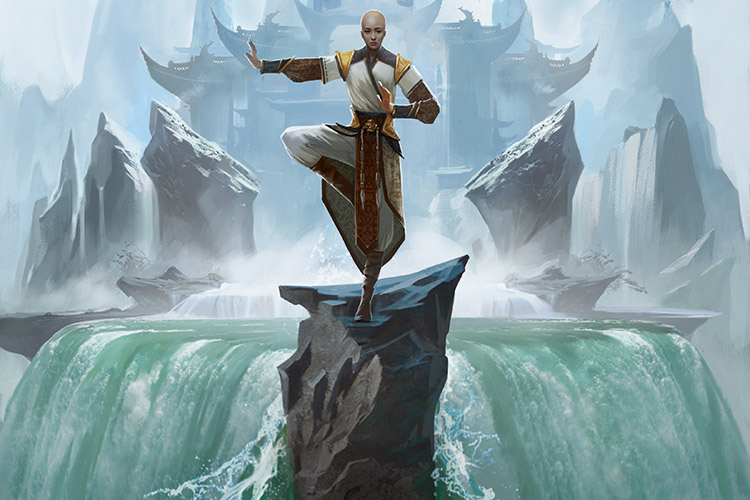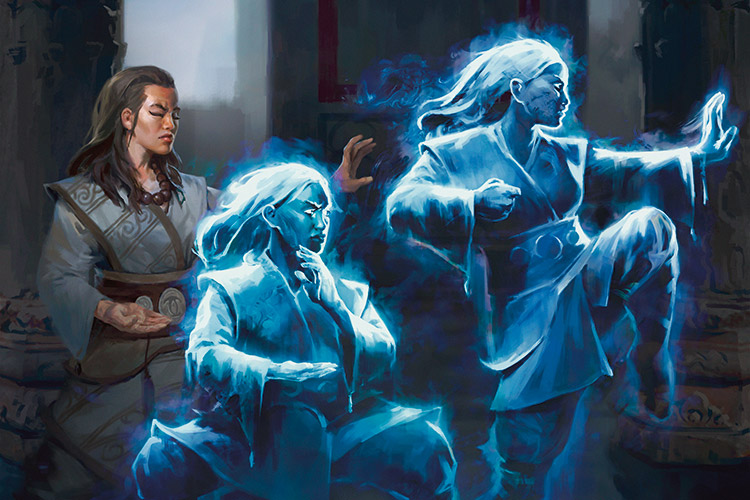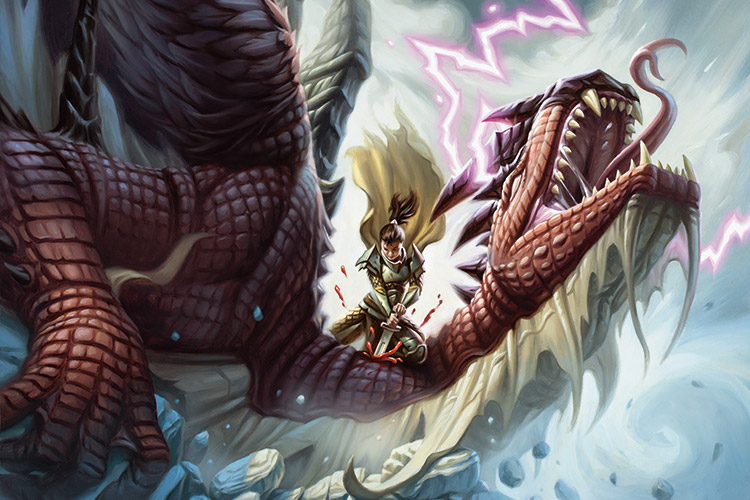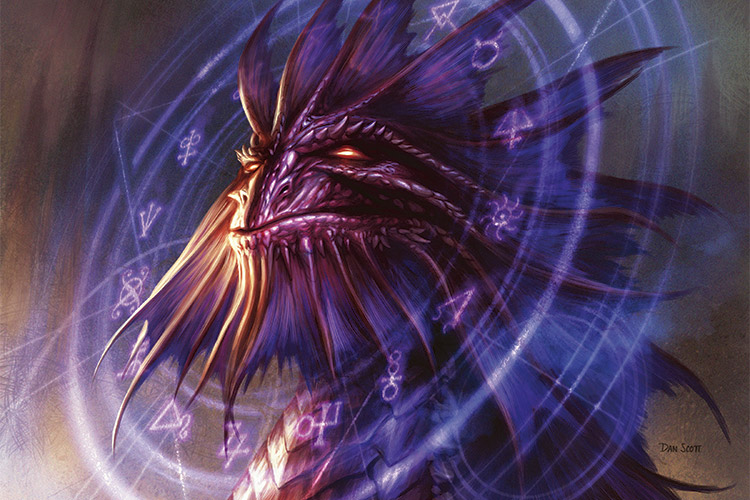The Metagame
Your tournament performance will be determined by more than just your skill in deck building and game play. In Magic, it's also important to predict what strategies your opponents will be using, and make an effort to counter them as effectively as possible. Understanding how other players think can give you a leg up on the competition.
The metagame (the game outside the game) are all of the decisions, resources, and information that, while not explicitly part of the game, are nonetheless important to Magic.

Sight Beyond Sight | Art by Anastasia Ovchinnikova
In other words, the game that we play is called Magic: The Gathering. It's governed by precise sets of rules concerning deck building, game play, and tens of thousands of cards. The metagame is everything in Magic that's not defined by the rules. It's the deck archetypes that are popular, the new combo that everyone's talking about, and the hot sideboard strategy for the Esper mirror match. It's everything that the players know, and everything that the players know the other players know. As you read, this article is becoming part of the metagame.
Understanding the metagame can be just as important as the general strategy of the game itself.
Imagine that your group of friends loves to play strategy war games that involve three different, distinct factions—let's call them the α (alpha), the β (beta), and the ω (omega)—each with its own strengths and weaknesses. To master the game, you'd need a deep understanding of all three factions. However, if all of your friends always play β, then for your metagame, it's in your best interest to practice only against β. If your friend Sandy always uses flying units, this is an important aspect of your metagame. If your friend Tommy has a poor internet connection and moves slowly during battles, this is an important aspect of your metagame. If you decide to branch out and play the game against new opponents, then your metagame will change and you'll need to adjust your practice methods and strategy.
What Decks Are You Likely to Face?
The most basic, and arguably most important, aspect of the Magic metagame is the relative popularity of different deck archetypes. (Recall that an archetype is a recurring strategy with many possible variations). If you could show up for your ten-player FNM knowing that three players will play Abzan, three players will play Esper, two players will play Mono-Red, and two players will play Green Devotion, then you could leverage that information into an advantage by building your deck accordingly. To think ahead about what decks your opponents are likely to bring to a tournament is called predicting the metagame.
For large tournaments, it's impossible to predict the metagame with the same level of precision with which we discussed the example FNM above. For a thousand-player Grand Prix, it's impossible to predict what every individual will do. Even if you could, it would be impossible to predict which of those individuals you're going to get paired against.
There's always a lot of uncertainty in predicting the metagame for a Magic tournament. However, it is absolutely possible to make a broad prediction like, "between ten percent and twenty percent of players will be playing Esper Control." Educated predictions like this are tremendously helpful.

Anticipate | Art by Lake Hurwitz
How to predict the Metagame
Years, ago, Hall of Fame pro Frank Karsten developed a method that's still used by many players and writers today. He called it the "winner's circle metagame." He would examine recent tournament results (for example, all Standard Grand Prix played in the last two months), he would assign each archetype:
- 2 points for finishing ninth through sixteenth
- 3 points for fifth through eighth
- 4 points for third and fourth
- 5 points for second
- 6 points for first
Then he would average out the data and assign each archetype a percentage. These numbers were meant to help predict what decks would be played and perform well the following weekend.
The "winner's circle metagame" is as good a method as any. What decks people have played in the past few weeks is a great indicator of what decks they're going to play this weekend. Moreover, the decks that people see doing well when they look at tournament results are also the ones they're likely to pick up for their next event.

Enduring Victory | Art by Mike Sass
However, it's important to remember that predicting a metagame is not an exact science. While the numbers can tell us a lot, in the end we're trying to guess at what a collection of individuals will do. There's no mathematical reason why a first place finish at Grand Prix Toronto ought to be valued exactly twice as highly as a tenth place finish at Grand Prix Shanghai played two weeks later.
The bottom line is that a variety of factors will influence the breakdown of archetypes you're likely to see at your next tournament. Here are some of them:
What archetypes have been popular lately?
For most things, what's happened in the past is the best indicator of what will happen in the future. Last week's metagame will have naturally accounted for most of the important factors. To ignore it would be a mistake.
What archetypes have been winning?
Players look at tournament results and see which decks are winning. Anyone who is undecided on what deck to play is very likely to pick up a deck that's had success recently. For some people it won't be the exact deck that got first place last weekend, but for others it will. You should put greater weight on better finishes and on more recent results.
What have the loudest voices been saying?
This could be a respected player in your region, or anything of the like. Most often, however, it means the popular columnists for the popular strategy websites. When Patrick Chapin speaks, the world listens. If he or one of his colleagues writes, "Mono-Red is great, everyone should play it!" that's well worth noting. Whether you and I actually think that Mono-Red is great is hardly relevant. The fact that it was said at all will make Mono-Red a larger portion of the field the following weekend.
Is Card Availability a Problem?
Are some decks prohibitively difficult to obtain? The older the format, the more important this will be. The higher the level of competition, the less important it will be. At the World Championship, every player will find a way to get the cards they want to use. For a low-stakes Legacy event on Magic Online or at a local store, budget decks might be major players.
Are There Any Other Applicable Trends?
There are plenty of intangibles that don't fall into one of the categories above, and yet can still impact the tournament field. For one example, I find that midrange decks like Abzan tend to be slightly over-represented because many people find them more fun to play with than extreme strategies like Mono-Red. For another example, fast strategies are slightly over-represented on Magic Online, because some players like to burn through lots of matches as quickly as possible.
In addition to not being an exact science, predicting the metagame is also a complicated issue with many, many factors to consider. I find it helpful to discuss it with my friends before a tournament. Where my own predictions often fall wide of the mark, a compilation of several educated guesses usually does pretty well. Moreover, I've found predicting the metagame to be a skill that one can cultivate through practice and experience.

Firemind's Foresight | Art by Dan Scott
What To Do With A predicted Metagame
There are three aspects of tournament preparation (in Constructed): archetype choice, fine tuning, and practice.
Once in a while, all factors might line up perfectly and lead you to predict a very extreme metagame. Such a thing is very rare, but let's say that you predict a single archetype to be thirty percent of the field at your next tournament! It might be in your best interest to make a metagame deck choice that will match up well against the field you expect, and absolutely crush the archetype that you feel will be most popular.
Some players have had a lot of success with such a technique, but it's rarely an approach that I choose personally. Particularly with all the uncertainties of predicting the metagame, I prefer to focus on the latter two aspects of tournament preparation—mastering my deck of choice and having the best possible decklist for it.
What I will most definitely do is choose some of my cards with the predicted metagame in mind. If I'm playing Abzan and I predict a lot of Mono-Red, you'd better believe that I'm going to pack three or four Drown in Sorrows in my sideboard!
Finally, your predicted metagame should help guide your practice sessions. Not only does this mean practicing against what you expect to be the most popular decks, but also putting emphasis on new breakout decks that you haven't played against before, and on oddball decks that are different from what you're used to.
For example, nobody knows what to do the first time they play against Jeskai Ascendancy Combo. Jeskai Ascendancy Combo is an unpopular deck, and one that you can typically ignore. However, if there was some kind of new information that leads you to believe Jeskai Ascendancy Combo might be heavily played at your next tournament, a little bit of practice in the matchup would be tremendously helpful.
Information Cascades
In the seminal article, Information Cascades in Magic, Patrick Chapin described a phenomenon that, from my experience, is quite important to competitive Magic. Sometimes, the metagame reaches a point where what players are doing is determined more by what other players are doing than it is by what are actually the best strategies.
Chapin begins with an example of an archetype that history has determined was not a particularly good one. However, at the time, it was an extremely popular deck that lots of players chose to bring to tournaments. With enough popularity, even poor decks will break through to Top 8s and win tournaments. More players see the deck putting up good results, and choose to pick it up for themselves. In this way, a deck's popularity feeds on itself. Mr. Chapin called this an example of an Information Cascade.
The opposite can also be true. I believe that great archetypes and strategies often "get lost" from the tournament scene. People brush them off simply because they haven't seen other players using them recently. The archetype might be great, but if it's not popular enough, it might fail to have breakthrough finishes, and its lack of popularity will feed on itself.
It's easy to see with a quick look at tournament coverage which decks are making Top 8s. It's typically not easy to see which decks have strong or weak win rates, and which ones have untapped potential.

Mystic of the Hidden Way | Art by Ryan Alexander Lee
Consider this fictional (but from my experience, quite realistic) example. Jane Doe builds a mono-blue beatdown deck and plays it to a stellar third-place finish at a Grand Prix. Her deck gets mentioned in the coverage, but largely overshadowed by the winning deck, and by a second deck that put three copies in the Top 8. Jane Doe is not a famous player, and through sheer coincidence, none of the most popular columnists choose to feature her deck. In the next two Grand Prix, a small, dedicated group of players pilot mono-blue to good overall results, but none break through to a Top 8.
Under these circumstances, mono-blue could well be one of the best archetypes in the format, but a month after Jane's great finish, it would most certainly be an unpopular deck.
Once in a while, finding one of these "lost decks," can be a great way to get an edge in a tournament. It's led me to success a handful of times in my career, especially in formats like Legacy, which are slow to change.
The major point that Patrick Chapin was trying to drive home is that there are times to listen to the community and to the tournament results, and there are times to think for yourself and make your own decisions.
The only thing that's certain is that you should always keep your eyes open and pay attention to what other players are doing. Some of the time, you'll take your strategy from what you read in an article or in tournament coverage. But all of the time, you'll benefit from knowing what your opponents are likely to be up to.

